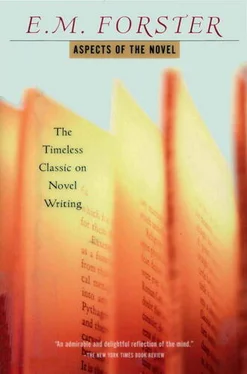I used to think this, through misunderstanding Jane Austen's method—exactly as Scott misunderstood it when he congratulated her for painting on a square of ivory. She is a miniaturist, but never two-dimensional. All her characters are round, or capable of rotundity. Even Miss Bates has a mind, even Elizabeth Eliot a heart, and Lady Bertram's moral fervour ceases to vex us when we realize this: the disk has suddenly extended and become a little globe. When the novel is closed, Lady Bertram goes back to the flat, it is true; the dominant impression she leaves can be summed up in a formula. But that is not how Jane Austen conceived her, and the freshness of her reappearances are due to this. Why do the characters in Jane Austen give us a slightly new pleasure each time they come in, as opposed to the merely repetitive pleasure that is caused by a character in Dickens? Why do they combine so well in a conversation, and draw one another out without seeming to do so, and never perform? The answer to this question can be put in several ways: that, unlike Dickens, she was a real artist, that she never stooped to caricature, etc. But the best reply is that her characters though smaller than his are more highly organized. They function all round, and even if her plot made greater demands on them than it does, they would still be adequate. Suppose that Louisa Musgrove had broken her neck on the Cobb. The description of her death would have been feeble and ladylike—physical violence is quite beyond Miss Austen's powers—but the survivors would have reacted properly as soon as the corpse was carried away, they would have brought into view new sides of their character, and though Persuasion would have been spoiled as a book, we should know more than we do about Captain Wentworth and Anne. All the Jane Austen characters are ready for an extended life, for a life which the scheme of her books seldom requires them to lead, and that is why they lead their actual lives so satisfactorily. Let us return to Lady Bertram and the crucial sentence. See how subtly it modulates from her formula into an area where the formula does not work. "Lady Bertram did not think deeply." Exactly: as per formula. "But guided by Sir Thomas she thought justly on all important points." Sir Thomas' guidance, which is part of the formula, remains, but it pushes her ladyship towards an independent and undesired morality. "She saw therefore in all its enormity what had happened." This is the moral fortissimo—very strong but carefully introduced. And then follows a most artful decrescendo, by means of negatives. "She neither endeavoured herself, nor required Fanny to advise her, to think little of guilt or infamy." The formula is reappearing, because as a rule she does try to minimize trouble, and does require Fanny to advise her how to do this; indeed Fanny has done nothing else for the last ten years. The words, though they are negatived, remind us of this, her normal state is again in view, and she has in a single sentence been inflated into a round character and collapsed back into a flat one. How Jane Austen can write! In a few words she has extended Lady Bertram, and by so doing she has increased the probability of the elopements of Maria and Julia. I say probability because the elopements belong to the domain of violent physical action, and here, as already indicated, Jane Austen is feeble and ladylike. Except in her schoolgirl novels, she cannot stage a crash. Everything violent has to take place "off"—Louisa's accident and Marianne Dashwood's putrid throat are the nearest exceptions—and consequently all the comments on the elopement must be sincere and convincing, otherwise we should doubt whether it occurred. Lady Bertram helps us to believe that her daughters have run away, and they have to run away, or there would be no apotheosis for Fanny. It is a little point, and a little sentence, yet it shows us how delicately a great novelist can modulate into the round.
All through her works we find these characters, apparently so simple and flat, never needing reintroduction and yet never out of their depth—Henry Tilney, Mr. Woodhouse, Charlotte Lucas. She may label her characters "Sense," "Pride," "Sensibility," "Prejudice," but they are not tethered to those qualities.
As for the round characters proper, they have already been defined by implication and no more need be said. All I need do is to give some examples of people in books who seem to me round so that the definition can be tested afterwards:
All the principal characters in War and Peace, all the Dostoevsky characters, and some of the Proust—for example, the old family servant, the Duchess of Guermantes, M. de Charlus, and Saint Loup; Madame Bovary—who, like Moll Flanders, has her book to herself, and can expand and secrete unchecked; some people in Thackeray—for instance, Becky and Beatrix; some in Fielding—Parson Adams, Tom Jones; and some in Charlotte Brontë, most particularly Lucy Snowe. (And many more—this is not a catalogue.) The test of a round character is whether it is capable of surprising in a convincing way. If it never surprises, it is flat. If it does not convince, it is a flat pretending to be round. It has the incalculability of life about it—life within the pages of a book. And by using it sometimes alone, more often in combination with the other kind, the novelist achieves his task of acclimatization and harmonizes the human race with the other aspects of his work.
II.Now for the second device: the point of view from which the story may be told.
To some critics this is the fundamental device of novel-writing. "The whole intricate question of method, in the craft of fiction," says Mr. Percy Lubbock, "I take to be governed by the question of the point of view —the question of the relation in which the narrator stands to the story." And his book The Craft of Fiction examines various points of view with genius and insight. The novelist, he says, can either describe the characters from outside, as an impartial or partial onlooker; or he can assume omniscience and describe them from within; or he can place himself in the position of one of them and affect to be in the dark as to the motives of the rest; or there are certain intermediate attitudes.
Those who follow him will lay a sure foundation for the aesthetics of fiction—a foundation which I cannot for a moment promise. This is a ramshackly survey and for me the "whole intricate question of method" resolves itself not into formulae but into the power of the writer to bounce the reader into accepting what he says—a power which Mr. Lubbock admits and admires, but locates at the edge of the problem instead of at the centre. I should put it plumb in the centre. Look how Dickens bounces us in Bleak House. Chapter I of Bleak House is omniscient. Dickens takes us into the Court of Chancery and rapidly explains all the people there. In Chapter II he is partially omniscient. We still use his eyes, but for some unexplained reason they begin to grow weak: he can explain Sir Leicester Dedlock to us, part of Lady Dedlock but not all, and nothing of Mr. Tulkinghorn. In Chapter III he is even more reprehensible: he goes straight across into the dramatic method and inhabits a young lady, Esther Summerson. "I have a great deal of difficulty in beginning to write my portion of these pages, for I know I am not clever," pipes up Esther, and continues in this strain with consistency and competence, so long as she is allowed to hold the pen. At any moment the author of her being may snatch it from her, and run about taking notes himself, leaving her seated goodness knows where, and employed we do not care how. Logically, Bleak House is all to pieces, but Dickens bounces us, so that we do not mind the shiftings of the view-point.
Critics are more apt to object than readers. Zealous for the novel's eminence, they are a little too apt to look out for problems that shall be peculiar to it, and differentiate it from the drama; they feel it ought to have its own technical troubles before it can be accepted as an independent art: and since the problem of a point of view certainly is peculiar to the novel they have rather overstressed it. I do not myself think it is so important as a proper mixture of characters—a problem which the dramatist is up against also. And the novelist must bounce us; that is imperative.
Читать дальше












